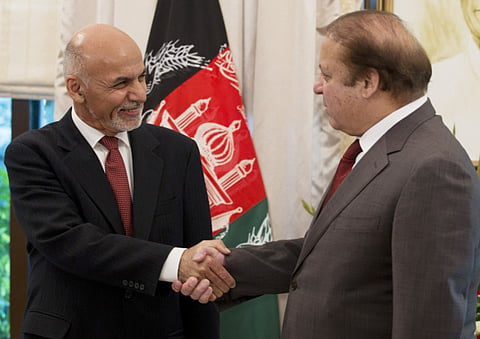Mutual distrust poisoning Pakistan-Afghan relationship
Only Islamabad is well-positioned to assist Kabul navigate the post-war period and both nations need to press the reset button going forward

Last week’s high profile visit to Islamabad by recently elected Afghan president Ashraf Gani has been surrounded by ample limelight and the usual fanfare when it comes to top leaders. It followed recent visits to Kabul, the Afghan capital, by Pakistan’s top decision makers including the army’s Chief of Staff General Raheel Sharif.
As the planned draw-down of US troops from Afghanistan gathers momentum to meet a deadline of the end of December 2014, its clear that Pakistan is left increasingly worried about future prospects for security across its north-western neighbour. In recent months, reports of increased activity by the Taliban around Afghanistan have indeed been a powerful reminder of their ability to cause havoc across the central Asian country, in spite of more than a decade-long military campaign by US-led western troops. Consequently, a further spillover of the Afghan conflict on to Pakistan’s soil must further challenge Islamabad’s already eroded authority over parts of the country.
Going forward, for Pakistan the risk is amply clear if indeed conditions in Afghanistan deteriorate sharply. However, the risk to global security interests must also be adequately appreciated. Every major security challenge to Pakistan in the past three decades has either directly or indirectly emerged as a consequence of the Afghan conflict. Additionally, the recurring conflict in Afghanistan has fuelled global insecurity, most recently the trail which led to and flowed from the 9/11 terrorist attacks. More recently, reports of Daesh (the Islamic State of Iraq and the Levant) seeking recruits from Afghanistan and the border areas of Pakistan, is just another powerful reminder of this trend.
The controversy following Gani’s election as Afghanistan’s president this year came as a powerful reminder of the complicated nature of Afghanistan’s internal ruling structure. The squabbling between Gani and his chief rival, Abdullah Abdullah, over the way the polls were held, will not be easily forgotten. The recent political turmoil has every chance of recurring in future given the country’s internal divisions. And last but not the least, the tenuous hold of Afghanistan’s ruling structure over parts of the central Asian country must remain a cause for anxiety to anyone looking at its future. Given that the ruling regime in Kabul just doesn’t have even token authority over parts of the country there is ample room for the emergence of local militant groups behaving autonomously.
Weakened economy
More importantly, this is exactly the kind of space that non-state actors need to thrive, which in turn creates room for foreign intrusion of the kind that has only fuelled Afghanistan’s conflict in the past. In a post US-led western withdrawal phase, no country except Pakistan is adequately positioned to assist Kabul in dealing with its crisis-stricken outlook. As western troops prepare to depart, questions continue to mount over the ability of Afghanistan’s armed forces to withstand the pressure from the Taliban. At one time, the US-led western world was ambitiously positioning itself to establish a large armed force to defend Afghanistan. That idea has faced a reality check. Not only was it difficult to create a large force, which at one time was talked about as comprising more than three hundred thousand soldiers.It’s also difficult to imagine the continued existence of such a force in a country with a clearly weakened economy. The question of ‘Who will pay the bill and how?’ continues to haunt Afghanistan, as it is pushed to adjust in the wake of the western world’s withdrawal. Already, reports of property prices beginning to slide downwards in Kabul in anticipation of shrinking inflows of US dollars says much about Afghanistan’s dependence on largesse of the US-led western world.
On Saturday, Gani, standing besides Pakistani Prime Minister Nawaz Sharif, sought closer ties with Islamabad and called for greater clarity in promoting relations between the two neighbours. Yet, it was equally clear to any student of recent trends surrounding Pakistan-Afghanistan relations that the much needed clarity is far from existence. The relationship continues to be undermined by mutual distrust of each others’ intentions. Pakistan worries about Afghanistan providing room to the intelligence services of India, Islamabad’s main foe, to use Afghan soil for the purposes of destabilising Pakistan.
On the contrary, Afghanistan continues to remain anxious over a Pakistan that is eventually positioning itself to back the installation of a Taliban-type regime in Kabul. It’s obvious that both countries need to radically depart from their baggage of history and break new ground built upon lessons learnt from history. While Afghanistan clearly lives with the destruction caused by more than three decades of conflict, the scars of battle are also obvious across Pakistan.
Since June this year, the Pakistan army has fought Taliban militants in the country’s North Waziristan region along the Afghan border, in the latest such struggle to defeat the militants who are seeking to seize the country. While the Pakistan army appears to have the upper hand in that offensive, there is a gap which is far from helpful. Like previous such battles, militants from the Pakistani side of the border have conveniently crossed over to Afghanistan, well outside the reach of Pakistani forces. Going forward, a much closer military and security collaboration is required by the two countries to win the conflict conclusively. Gani’s visit, though surrounded in the usual fanfare, marks just the first step to forge a much deeper relationship between Pakistan and Afghanistan. The reasons for doing just that are amply obvious.
Farhan Bokhari is a Pakistan-based commentator who writes on political and economic matters.
Sign up for the Daily Briefing
Get the latest news and updates straight to your inbox



